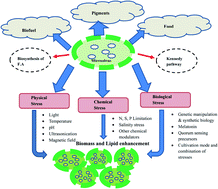Revisiting algal lipids and cellular stress-causing strategies for ameliorating the productivity of suitable lipids of microalgae for biofuel applications
Abstract
Lipids are the resource fuels for cells at the cellular level and one of the significant functional foods for driving nutrition in food webs; their chemical transformation provides biofuel (biodiesel) and co-products. Besides, lipids are signaling messengers in addition to their function as hormones in algae. Microalgae are ideal candidates for producing lipid-rich biomass to provide a potential sustainable biofuel that is carbon neutral and creates an opportunity to provide various co-products. This review covers, firstly, an overview of the biosynthesis of lipids and transformation of fatty acids in microalgae. Secondly, it emphasizes on the physical, chemical, and biological methods to ameliorate the biomass and lipid productivity with desired fatty acids, which could be transformable into biodiesel or nutraceuticals. It is also covers optimal techniques used for combining the stresses to tune the lipid productivity and fatty acid composition, in addition to the frontiers of research dealing with the use of chemical modulators and quorum sensing precursors to modulate the lipid/biomass productivity/composition as an essential component for the amelioration of cost-effective biofuel production.



 Please wait while we load your content...
Please wait while we load your content...